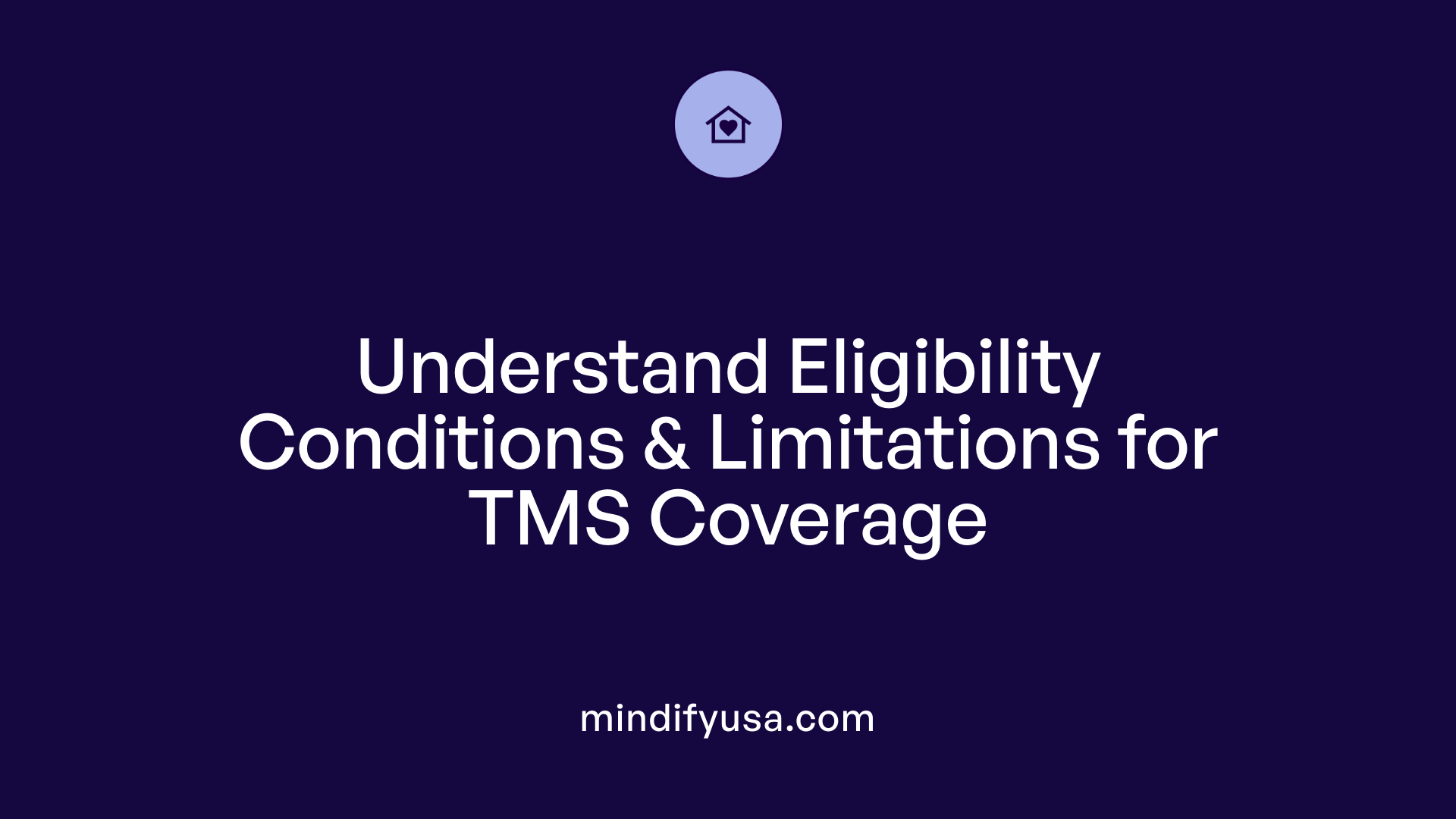Understanding Insurance Coverage for TMS Therapy
Transcranial Magnetic Stimulation (TMS) has emerged as a promising treatment for depression and other mental health conditions. As with many advanced therapies, understanding whether your insurance covers TMS is crucial for planning your treatment. This article provides a comprehensive overview of insurance coverage options, requirements, costs, and tips to help you navigate the process effectively.
Overview of Insurance Coverage for TMS Therapy

Basic eligibility for insurance coverage
Most health insurance plans in the relevant region provide coverage for transcranial magnetic stimulation (TMS) therapy for depression when specific medical criteria are fulfilled. To qualify, patients generally need a diagnosis of Major Depressive Disorder (MDD) or Obsessive Compulsive Disorder (OCD) confirmed through DSM-5 criteria. Additionally, evidence of unsuccessful previous treatments is crucial, including documented failures of at least two antidepressant medications from different classes and a trial of psychotherapy.
Insurance companies also require that the treatment be deemed medically necessary, the provider be in-network, and that the patient meet age requirements (commonly 18 or older). Certain health conditions—such as seizure disorders, psychosis, substance abuse, or presence of metallic implants—may disqualify coverage. Some insurers are more lenient, covering second-round TMS treatments or newer options like Deep TMS, especially as policies evolve in 2023.
Cost considerations are significant. Without insurance, full treatment can cost between $7,000 and $10,000. With coverage, the expenses are often reduced to copays or coinsurance, typically ranging from $10 to $70 per session.
Major insurance providers that cover TMS
Numerous leading insurers in the U.S. include Magellan Health, Optum, Health Net, MHN Health, Tricare, United Healthcare, Aetna, BlueCross BlueShield, Medicare, and Cigna. These payers generally approve TMS for depression and sometimes for OCD, provided the treatment aligns with their policies on medical necessity.
Most of these plans require prior authorization, proof of treatment failure, and comprehensive documentation. Notably, some insurance companies, such as MediCal and Medicaid, do not currently cover TMS. Patients should verify their insurance details directly, ideally with help from their healthcare provider.
Conditions covered under insurance policies
The primary condition for which TMS is covered is Major Depressive Disorder, especially when it has been resistant to medications and therapy. Most plans also include coverage for Treatment-Resistant Depression (TRD). There is growing acceptance for second-round treatments and newer therapies like Deep TMS.
In some cases, policies extend coverage to other conditions such as OCD, migraines, and smoking cessation, especially when previous treatments have failed. Coverage decisions are contingent on satisfying criteria like multiple medication trials, documented treatment failures, and demonstrating symptom improvement.
| Condition | Coverage Status | Additional Notes | Responsible Policy Factors |
|---|---|---|---|
| Major Depressive Disorder (MDD) | Widely covered, with restrictions | Requires treatment failure of meds/therapy | Diagnosis, prior attempts, provider network |
| Obsessive-Compulsive Disorder | Often covered, under specific conditions | Failure of two medication trials | Age, diagnosis confirmation, treatment history |
| Migraine | Limited coverage | FDA approved for migraines | Physician documentation, treatment history |
| Smoking Cessation | Increasing coverage | FDA approved for pharmacotherapy adjunct | Patient’s previous attempts, documentation of failure |
Understanding the nuances of insurance support is essential for patients considering TMS therapy. Working closely with healthcare providers and insurance representatives can facilitate approval and clarify costs.
Conditions and Limitations Affecting Insurance Coverage

Are there any policies or eligibility criteria I should be aware of for insurance coverage of TMS?
Insurance coverage for TMS therapy generally depends on several specific criteria. Most insurance providers require a confirmed diagnosis of Major Depressive Disorder (MDD) or Obsessive Compulsive Disorder (OCD) in line with DSM-5 standards. Eligible patients typically need to demonstrate that they have tried and failed multiple treatment options, including 2 to 4 different antidepressant medications and psychotherapy.
Age also plays a role, with most plans requiring patients to be at least 18 years old. In addition, insurance companies usually require prior authorization, meaning they need to approve the treatment plan before coverage begins. Documentation of medical necessity, including failed treatments and diagnosis, is essential.
Coverage eligibility varies between plans. Major providers like Medicare, Medicaid, BlueCross BlueShield, Aetna, Cigna, and United Healthcare generally cover TMS for those meeting specific conditions. However, the process often involves working closely with your healthcare provider and insurance representatives to ensure all documentation is correctly submitted.
It's crucial to verify with your insurer directly about their particular requirements, including any necessary medical records or proof of prior treatment failures. Understanding your policy's specifics can help streamline the approval process and avoid surprises.
What conditions might prevent me from qualifying for insurance coverage for TMS?
Several health conditions can disqualify individuals from obtaining insurance coverage for TMS therapy. Key disqualifiers include a history of seizure disorders, as TMS involves magnetic stimulation of the brain, which could potentially trigger seizures.
Presence of implanted metal devices is another major concern. These include pacemakers, cochlear implants, or any metal in the head or brain, which pose safety risks during TMS sessions.
Active psychosis or schizophrenia can also exclude patients from coverage, as TMS is typically used for unipolar depression or OCD that has not responded to other treatments.
Neurological conditions, such as neurological instability or certain brain injuries, may be considered contraindications. Substance abuse issues are also relevant—patients actively abusing substances should consult their healthcare provider about eligibility, as some plans may require a period of sobriety before approval.
Age restrictions are common, with most policies requiring treatment candidates to be at least 18 years old. Pregnant women and those with specific medical contraindications might also face coverage denial.
It’s vital to have a comprehensive discussion with your healthcare provider. They can help you understand whether these limitations apply to you and assist in navigating the insurance process based on your health status.
Strategies to Maximize Insurance Coverage and Reduce Out-of-Pocket Costs

How can I verify if my insurance covers TMS therapy?
The first step is to contact your insurance provider directly. Provide detailed information about your diagnosis, treatment history, and any necessary documentation like medical records and previous medication trials. Many insurers such as Aetna, United Healthcare, Medicare, and BlueCross BlueShield include coverage for TMS therapy for conditions like Major Depressive Disorder (MDD) and Obsessive-Compulsive Disorder (OCD).
Additionally, you can ask your provider’s clinic to fill out a Verification of Benefits (VOB) form, which their team submits to your insurer to confirm coverage details. It’s important to prepare your medical records, including diagnosis confirmation and evidence of unsuccessful treatments, as insurers often require this documentation for approval.
If the insurer denies coverage initially, discuss with your healthcare provider to gather more documentation or opinions that might help overturn the decision. Knowing your coverage status upfront helps you plan financially and avoid surprises.
What steps can I take if my insurance claim for TMS treatment is denied?
When facing a claim denial, start by carefully reading the denial letter to understand why the claim was rejected. Common reasons include incomplete documentation, the treatment not being deemed medically necessary, or your provider being out-of-network.
Work with your healthcare provider or the clinic’s insurance specialist to gather additional medical records, a detailed justification of the treatment’s necessity, and correct any errors in the claim. Most insurers provide a process for appealing denied claims—submit an appeal with extra documentation and a letter emphasizing medical necessity.
Persistence is crucial; in some cases, talking directly with an insurance representative or involving patient advocacy services can make a difference. Many denials—especially when evidence supports the treatment—are reversed upon review.
Are there alternative payment options if my insurance doesn’t cover TMS?
Yes. If insurance coverage is unavailable or limited, many clinics offer self-pay options. The costs range from about $2000 to $5000 for the full course of treatment. Payment plans and financing options are often available to make payments more manageable.
Some clinics might negotiate individual case agreements or provide discounts or sliding scale fees based on income. Check if your health savings account (HSA) or flexible spending account (FSA) can be used toward TMS costs.
In regions where insurance does not cover TMS, early discussions about all potential payment strategies help prevent financial surprises. Explore community resources, financial assistance programs, or charity options that may also provide support.
What are some practical tips for working with my provider to get TMS covered by insurance?
Effective communication is key. Work closely with your provider’s office or clinic staff to gather comprehensive medical documentation, including your diagnosis, past treatment failures, and psychotherapy attempts.
Request that your healthcare provider submits a detailed medical necessity letter supporting your TMS treatment request. Follow up regularly with your insurer or clinic’s insurance coordinator to check the status of your prior authorization.
If the initial claim is denied, do not hesitate to appeal. Provide any additional documentation and emphasize the treatment’s necessity based on your clinical course. Building a strong, well-documented case through persistence and advocacy improves the likelihood of approval.
Overall, proactive engagement, clear communication, and thorough documentation are critical components in navigating insurance approval for TMS therapy.
Final Thoughts on Navigating TMS Insurance Coverage
While insurance coverage for TMS has become more comprehensive and accessible, understanding the requirements, preparing documentation, and working proactively with providers and insurers are essential steps. Stay informed about your specific plan’s policies, be persistent in your efforts, and explore all available options to make this effective treatment financially feasible. With the right approach, many patients can successfully access TMS as a covered benefit, helping them achieve better mental health outcomes.
References
- Is TMS Covered By Insurance?
- The Ultimate Guide to Insurance Coverage for TMS Therapy
- Transcranial magnetic stimulation
- TMS Therapy Costs and Insurance Coverage
- Understanding Insurance Coverage for TMS
- NeuroStar ® Is Covered By Most Major Insurance Companies
- Navigating TMS Therapy Costs: Your 2025 Guide Explained
- Does Cigna insurance cover TMS Therapy
- Is TMS Covered By Insurance?





































































































